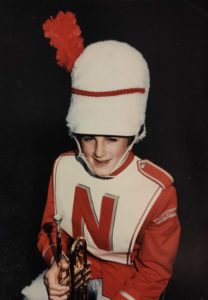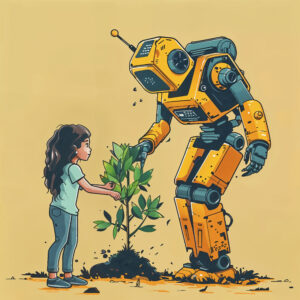
Measurements of Success in Sports & Studies
You may have seen the new Netflix documentary ‘Beckham’, about one of England’s most well-known footballers. Near the start, Beckham talks about his school days


Chris Baier is a DP math and physics teacher at OYIS. Although he understands soundwaves, he struggles to produce ones that are pleasing to the ear.

What’s wrong with our work being hard? Why does a task being difficult cause stress? What’s so bad about not succeeding?
As high school teachers we often hear students link “hard” subjects to dislike and “easy” work to pleasure or enjoyment. Why is that? I’ve never really understood why something that is difficult is seen as bad while something that is more elementary is seen as good. Or, why is it bad to encounter something that we aren’t necessarily skilled at?
I first started playing trumpet when I was in 4th grade. For the life of me, I can’t even remember why I picked the trumpet other than the fact that I was required to learn an instrument in order to reside in my home. Maybe it was that it was gold-colored, maybe it was the fact that it was loud, or maybe it was that I was legally allowed to spit indoors whenever I cleared the valves. Anyway, for whatever reason, the trumpet was chosen and so began my life with this brass instrument. I remember practicing every day, filling out the times in my practice sheet with my pencil. 42 minutes on Monday, 40 minutes on Tuesday, 48 minutes on Wednesday, 44 minutes on Thursday, 16 minutes on Friday (The Dukes of Hazzard was on TV that night).
Eventually, the First Book of Practical Studies of the Trumpet led to the second and I slowly got better and better. During those years, I played in both the middle and high school concert bands as well as the marching band. I moved slowly up and up, from the lowest third chair, to the middle of the second chairs, to eventually plateauing at a high second chair. Occasionally, if I got lucky, a first chair would have strep throat or something and I’d get the chance to play their part, but for the most part, that was my peak as a trumpet player: second chair. I’d practice and practice, but I knew this was my summit. Was this sad? No way. Some of my deepest high school friendships were formed during band practices. Even today, thirty-six years later, I can still play our entire marching band’s street beat cadence on a table with a couple of pencils and hum along to any Sousa tune.
Then college came and the trumpet was left in my closet.
After college, I was working back in my hometown when a friend, who was the musical director of a local theater, asked me if I could play trumpet for an upcoming production of The King and I. Nervously, I said okay. Being the only non-professional musician in the pit was daunting to say the least. There were no formal music practices. In fact, the only time we (as a band) played the whole piece together was during the first and only dress rehearsal. All of the members of that band could instantly and perfectly read any sheet music that was placed before their eyes. I still remember being utterly amazed at the first chair horn player that transposed all of the music in his head on the fly. Luckily, I had gotten the charts a week earlier, and I practiced and practiced and practiced and was able to not make too much of a fool of myself come performance time. The third chair does have its pluses, all whole notes with only a high G—it can make anyone seem competent. I didn’t have any solos; I wasn’t paid. Was this a meaningless experience? No way. That opportunity sowed the seed for my love of musicals and the theater. No joke, when I want to get stoked I put on A Chorus Line or Jesus Christ Superstar and start singing along. I still have a dream of one day playing Caiaphas on stage… it’s a long shot, though.
I moved out to Seattle then and the trumpet went back in the closet. Until ….
I randomly decided, at age 29, to take a Jazz Improv course at the local community college. I’m still not sure why I signed up for that class… probably because I had never played jazz before, and I wasn’t really doing anything on a Tuesday night. The course itself was nothing great – six weeks with 45 people crammed together in a room all taking turns at soloing over “C Jam Blues”, but it was through that course that I met a guitarist and saxophonist, and we decided to form a jazz band. We ultimately became a six-piece band when we added a killer bassist from Uzbekistan, a revolving door of different drummers, and a 90-year-old clarinet player (who, interestingly enough, was the last medical doctor in Seattle who still did housecalls before his retirement). We called ourselves The Little Big Band and we played mostly swing and bop era jazz music. We had monthly gigs – nothing big mind you – a pizza parlor here, a local pub there. I can still remember being squashed in next to the pizza oven, sweating profusely while trying to play “Well You Needn’t.” Mostly our fans consisted of people chewing on slices or friends coming out to see us play. We got paid once or twice, I think. I was (and still am) never that good at soloing. I love doing it, and will occasionally be able to eke out a lick from the horn that sounds kind of cool, but overall I am content creating something simple, yet unique, from quarter-notes and my octave and a half range. Was my time playing in a mediocre band a waste? No way. It gave me an opportunity to be creative, to get out in my community, and to learn about jazz music. Honestly, nothing is more calming to me than walking into any business and hearing jazz music being piped through the airwaves.
I still practice my trumpet today, although not as regularly as I should. I’ll pull out the old Abersold book and solo along to a blues riff or I’ll practice all my scales using the circle of fifths. It doesn’t really matter what I’m practicing: it’s just fun to play. To improve. To make noise. I’ll never be that good of a trumpet player, but it’s shaped me into the person I am today in innumerous ways and it continues to do so. So, let’s hear it for those things that we aren’t that good at—perhaps they are the most important things in our lives.

You may have seen the new Netflix documentary ‘Beckham’, about one of England’s most well-known footballers. Near the start, Beckham talks about his school days

Students who are eligible for Grades 10 or 11 in August 2023 are invited to take the 2022 Scholarship Exam. This exam is the first step to potentially receiving the OYIS Achievement Award.

Osaka YMCA International School is hosting a professional learning event on Saturday, February 8, 2025. The focus of the sessions will be Rethinking Assessments, broken

Since November 2022 when ChatGPT was released to the world, it’s seemed that AI has been everywhere in the news. Since then, AI has become

Celebrating Our Teachers: 5 Educators Earn SENIA Level 1 Certification! We are excited to announce that five of our dedicated teachers have recently completed their

Being Good Enough vs Being Perfect The idea of having to achieve the highest level of perfection is something that often affects the best of
Click here to start your application
Sign in Here
Osaka YMCA International School – Copyright 2025